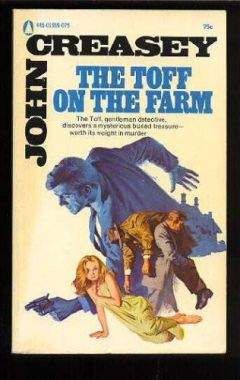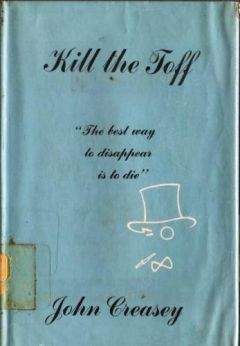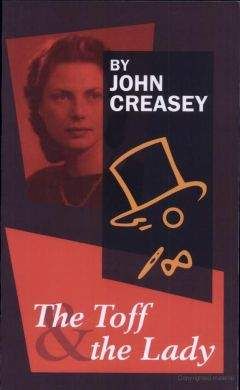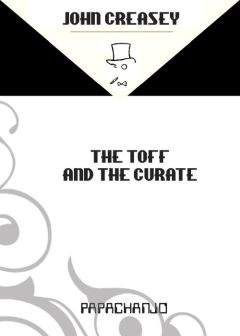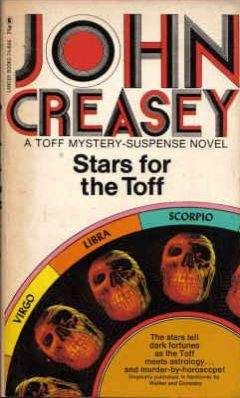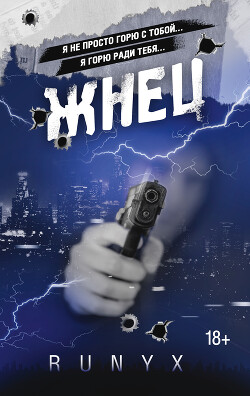John Creasey - The Toff In Town
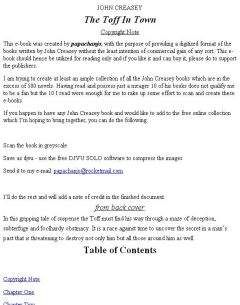
Помощь проекту
The Toff In Town читать книгу онлайн
Everything would be all right!
Anxiety hadn’t quite gone; Bob had been too emphatic about the police, as if some crime were heavy on his conscience, but he had been transformed, almost normal, since the call from the B.B.C. Bob to broadcast! Would she be able to go with him? Or would it be better to hear him on their own radio? She glanced at it, where it stood on the bedside table, then stepped across the room and picked up the Radio Times. She turned over the pages to Saturday and read:
6.15 p.m. In Town To-night.
400 Edition.
Once again we stop the mighty roar of London’s traffic and bring to you some of the interesting people who are in town to-night.
She put the paper down, and saw a small slip of paper on the floor. It was yellow with age, and when she picked it up, she saw some shorthand notes on it. She couldn’t make out the meaning, but it was obviously too old to matter. She screwed it up and tossed it into the waste-paper basket, then went across and glanced at herself in the mirror again, satisfied that she looked her best
It had been impossible to judge how long Bob would be, so they had arranged to meet outside the Aeolian Hall at half-past four. She had only twenty minutes to get there from St. John’s Wood; she shouldn’t have had a bath. She picked up her hand-bag and gloves, and stepped into the hall.
The front door bell rang.
“Oh, bother!” she exclaimed.
Even if the caller only delayed her for a few minutes, she could now no longer hope to be in New Bond Street at half-past four. She hurried to the door and opened it briskly. Then looked in surprise at two men—one little more than a boy. They were dressed in blue overalls, and one of them carried a rope-bag.
“Good-afternoon,” said Barbara.
“Afternoon. Miss. Come about the gas.”
“Gas?” echoed Barbara. “I haven’t sent——”
Then a great fear welled up in her, for the bigger of the two lunged forward. He had something in his hands—a large sponge. While that stab of fear was making her heart swell, and pain shot across her breast, he thrust the sponge into her face. She caught a whiff of a penetrating smell which took her breath away. Her hands were gripped from behind, and she felt herself dragged into the hall. She couldn’t see; something was burning her face, a cloud was filling her mind, it was as if she were breathing in smoke, dense black smoke. Then she couldn’t breathe at all. She retched. The pressure on her arms increased, the burning sensation was unbearable, but—it didn’t last long. That great black cloud enshrouded her, all other pain was lost in the agony of choking, she seemed to be rising from the floor.
She felt sick.
She was sick . . .
She lay back exhausted. There was something hard beneath her head. She couldn’t see properly because of a mist in front of her eyes. She felt the awful nausea in her stomach, and her lips and nose were sore—terribly sore; burning.
The mist receded.
She was in the hall, lying on the floor. She could see Bob’s mackintosh and overcoat hanging on the hall-stand, and the black and white country scene on the wall.
She remembered.
Another spasm of fear clutched at her, as if a hand were gripping at her inside and twisting, but she struggled to get up. One shoe was off, lying near the hall-stand. Her gloves were by her side, her hand-bag was lying open, and all the contents were strewn about the floor.
She stood up.
She caught sight of herself, as she swayed forward, in the hall-stand mirror. Her lipstick was smeared and she was very red about the nose and mouth—but that wasn’t all lipstick; something had burned her. She saw something else. The buttons of her white blouse were undone. She shivered involuntarily, she hadn’t done that. What had happened? What had happened to her? Those two men
She made herself go into the sitting-room, but was exhausted when she reached the nearest chair, and sank into it. The clock began to strike. She missed counting the first. Four—not four, she had heard four. It was—nearly six o’clock, the hands wouldn’t keep steady. It was six o’clock.
She was an hour and a half late. Bob—why hadn’t he returned? Was he still waiting for her? She remembered everything clearly now, but even anxiety about Bob faded into the background. Recollection of the way that man had darted forward and thrust the sponge over her face made her shudder again.
Bob would come back soon, he’d realise that something had gone wrong.
After a while she got up. The burning on her face was very painful, she must bathe it. She went into the bath-room and sprinkled some boracic powder into the hand-basin and bathed her lips and nose, but it didn’t help much. They were puffy and swollen and there was a foul taste in her mouth. She had been chloroformed, she realised. Chloroformed, and
She looked down at her blouse.
Only now did she realise that everything in the first-aid cabinet had been moved. Several things, including Bob’s shaving tackle were on the floor. She couldn’t understand it—but understanding dawned when she returned to the sitting-room, feeling no better, but at least able to see and to take notice. The contents of a writing-table were strewn on the top, the drawer of a card-table was lying on the floor, and the contents were scattered all over the carpet. She made herself go into the bedroom and the tiny dining-room, and found everything in chaos. The fact that it would take hours to straighten everything hardly occurred to her. She ought to tell the police.
Then she remembered what Bob had said about them.
Why hadn’t he come back?
She rinsed her mouth out with cold water, using a mouthwash tablet. Thieves, police, Bob. She went into the hall and looked at the telephone—and it rang!
The sound startled her so much that she jumped and backed away, knocking her head against the wall. The bell went on ringing. She trembled as she stepped towards it, and the receiver quivered in her hand. Her voice was no more than a husky whisper.
“Can’t hear you.” The voice at the other end of the line was sharp, unfamiliar, impatient.
“Mrs.—Alien—speaking.”
“Okay,” the man said. “Your husband’s been delayed. Might not be home until late.”
“Is that the B.B.C.?” she asked, but there was no answer, and she heard the receiver go down at the other end. She held hers in her hand for some seconds, then slowly put it back. Bob delayed, might not be home until late. But—that voice, it hadn’t been a B.B.C. voice! In a sudden frenzy she picked up the directory. Her fingers trembled, she kept fumbling for the “B’s”, found them at last and after a frantic search, found: “British Broadcasting Corporation.” She didn’t want Broadcasting House—Aeolian Hall, there it was.
She dialled.
“B.B.C.,” said a girl crisply.
“May I—may I speak to Mr. Hedley?”
“I’m sorry, I can’t hear you very well. Mr. Who?”
“Mr. Hedley!” She shouted this time, her voice suddenly strong, and the operator said: “I’ll see if he’s in his office.” She held on for a long time, and began to think that she had been forgotten, when the girl spoke again. “I’m sorry, he’s left the building.”
“Are you—sure?”
“Yes, I’m afraid so.” Bless that girl, she wasn’t curt, she was helpful.
Barbara said: “I’m sorry to be a nuisance, but my husband had an appointment with Mr. Hedley this afternoon and—and I want to know whether he’s left.”
“What name is it, please?”
“Allen—Robert Allen.”
“I might be able to find out,” said the girl. “Hold on, please.”
There was another long wait Barbara hooked a chair with her foot, drew it close to the table and sat down. She felt so weak. It was half-past six now.
“Hallo,” said the girl.
“Yes?”
“Mr. Allen left just after four o’clock,” the operator reported. “I’ve spoken to someone who was in the office at the time. I’m sorry.”
“That’s—all right,” said Barbara. Thank you very much.”
She replaced the receiver and stared blankly in front of her. If Bob hadn’t been detained at the B.B.C., who had telephoned to say that he would be late? Where was he? The mystery which created his fear and her unhappiness closed down upon her.
Bob hadn’t returned at nine o’clock.
Barbara had not left the flat, had spoken to no one. Wearily at first, she had tidied up; the rooms were more or less in order now. She couldn’t think of anything that was missing. The few pounds, the ready money she always kept tucked away in a drawer, had been on the floor; if the thieves had wanted to take money, why hadn’t they taken that? Her few oddments of jewellery were still on the dressing-table. All her clothes and Bob’s were there, and yet the man had searched every nook and cranny, even the larder.
The Waste-paper basket overflowed with oddments of paper, old powder-puffs, an accumulation of rubbish. She emptied the basket into the fireplace, and put a match to them, then watched them flare up.
She felt better, and rather hungry. She made herself some tea and ate some biscuits—the tin lid had been left off by the intruders. The tea was hot and stung her lips and mouth, so she cooled it with more milk. Her face was badly swollen but not so sore. She had done her hair and wiped off her lipstick; she looked a sight, but that didn’t matter.
What had the man meant by “late”?
Was it “late” now?
If only Bob hadn’t been so insistent about not going to the police, she would have telephoned them, but she could not doubt that the burglary was connected with the mystery, and she couldn’t let him down. But if he didn’t return soon, she’d have to telephone Scotland Yard. How long dare she leave it? Until ten o’clock?
Or eleven?
At half-past ten she went into the bedroom, aimlessly, perhaps partly to keep away from the telephone. Ringing up the police and reporting that Bob was missing seemed the only thing to do, but—was he really missing yet? How she hated that word! “Missing—feared dead.” She went to the other side of the bed, Bob’s side, and saw the old newspapers on the chair, a pile of them. He had managed to get some back numbers of Sunday papers; he had been hungry for news of what had happened while he had been away.
She remembered their talk after lunch about Snub Higginbottom, a useful man in a tight corner. In a frenzy, she picked up the newspapers and spread them out over the bed. If she couldn’t consult the police, she must talk to someone. She went through paper after paper, looking for headlines about a murder trial. It took a long time, and she was in her own light, her shadow darkened the pages. She might have missed
There it was!
In evidence, Mr. James Higginbottom said . . .
She skimmed what he had said as she searched for his address; she did not find it, but there was an address further down the page.
The Hon. Richard Rollison, of Gresham Terrace, W.I., gave evidence of finding the body. Mr. Rollison . . .
She didn’t trouble to read on from there, but went into the hall and looked for “Higginbottom” in the directory. There were several, but she couldn’t be sure which was James or “Snub”. She looked for Rollison. The entry was there all right, “Rollison, R. The Hon., 55g, Gresham Terrace, Mayfair . . .
CHAPTER THREE
HELPING HAND
IT was some time before a man with a deep voice announced: “Rollison here.”
“I—I’m sorry to worry you,” said Barbara. “Can you please tell me where to find Mr. Higginbottom? Mr. James Higginbottom? I think—you once——”
“I know Mr. Higginbottom,” said the man with the deep voice, “and I can give you his address, but you won’t find him in to-night, I’m afraid.”
“Oh no,” said Barbara.
All her dismay and despair sounded in that single exclamation.
“Perhaps I can help you,” the man suggested.
“I—I don’t think so,” said Barbara. “I just wanted——” She couldn’t go on.
“I might be able to get in touch with Mr. Higginbottom, if it’s really urgent,” said Rollison.
He sounded friendly and anxious to help, and she couldn’t stop herself from bursting out:
“Oh, it is!”
Then give me your name and telephone number,” said Rollison. “You would like to see him to-night, I imagine?”
“Oh, yes, please.” She gave him the details. “It doesn’t matter how late it is, I shan’t be able to rest until I’ve seen him.”
“If I were you, I’d try,” advised Rollison.
She rang off, and smiling wanly at the recollection of his advice, went into the bedroom, kicked off her shoes, and lay down. The man had sounded so calm and reassuring that she began to wonder if she were making too much fuss. Bob might return soon. It wasn’t yet late; not really late.
Richard Rollison stood up from his desk in his large study-cum-sitting-room, and, without looking at the papers which he had been reading, went into the hall.
This was quite roomy and furnished sparsely, although a connoisseur would have appreciated the old oak settle with a swing seat, and the near-black wardrobe, the small but exquisite water-colours on the walls. A thick-pile brown carpet covered the floor. A short passage led off the hall to his man’s room, the kitchen and the bath-room. The main rooms all led from the hall.
He called out: “Asleep yet, Jolly?” and his man answered in a sleepy voice: “No, sir, not at all.” Rollison smothered a grin and opened the door.
By day, Jolly always dressed in black. By night, his colour scheme was much more gay, and he wore bright yellow pyjamas which were somewhat unexpected in a room which was obviously a man’s. It was rather crowded, with good but not antique furniture, and one wall was lined with books.
The light from a bedside lamp reflected from the yellow garments and gave his lined face, with its dewlaps, a look of yellow jaundice. He had been reading, in bed, and struggled to sit up while retaining hold on his book.
“Let me help you,” said Rollison gravely.
“I can manage quite well, sir, thank you,” said Jolly. “I must have been nearly asleep,” he remarked. “I’m sorry sir.”
“I wish I were nearly asleep,” said Rollison smiling into Jolly’s brown, soulful-looking eyes. “But I’m going out.”
“Can I get you anything?” asked Jolly.
“I hope I’m not going to need anything,” said Rollison. “Jolly, between these four walls——”
